- Home
- Alice Hoffman
Magic Lessons Page 12
Magic Lessons Read online
Page 12
When Mrs. Henry looked at Maria, she saw a healer, not a witch, and she would always be grateful for the lily-of-the-valley tea Maria had used to stop the older woman’s heart from fluttering one night when she fell faint. Mrs. Henry swore she would surely be in her grave if not for that curative; she opened her heart to Maria and her charming little girl, and was happy to share her own cures.
Boston Remedies
Honey and milk for worms.
Salt and molasses for cuts.
Huckleberries boiled for stomachaches.
Balm of Gilead buds boiled into a paste for wounds.
Dark blue violets as a tincture for mouth sores.
Chickweed prevents toothaches.
Table salt and vinegar, fermented, for colic.
Castor oil, milk, and sugar for a children’s tonic.
Maria had confided that she was in search of a man, like so many women who had been forsaken by husbands and fathers who had come to the New World promising to send for them, then disappearing into cities or the wilderness. This came as no surprise to Mrs. Henry. Women in search of men were nothing new in Boston. There were signs tacked to lampposts and on market stalls with descriptions of lost husbands, which sometimes included the image of a face, drawn to the best of the bereaved’s abilities. Maria could often see where the missing were when she set out a pan of water for scrying, and she gave out the addresses of lost men, many of whom didn’t wish to be found; she warned her clients that sometimes it was best to let the lost remain so, for they might not be pleased once their loved ones were located.
Try as she might, Maria could not see John, not in the water and not in the black mirror, which she kept carefully stored in a piece of blue flannel so that it would not break. Hannah had told her that when a person looked in the mirror she would see what she must, not what she wished to see. John was never there. She could only see him in her daughter’s features—the high cheekbones, the lanky arms and legs, the particular way she laughed with her head thrown back, exactly as her father had when he stepped into the turquoise water and found the world to be a miracle.
* * *
It was Mrs. Henry who directed Maria to Salem. By then it was early spring and Faith had passed her first birthday. The ice was melting in the streets, and as always at this time of year the harbor was filled with ships. A customer returning from London mentioned he was on his way home to Essex County.
“How many people can there be in one county?” Mrs. Henry said to Maria. “Perhaps he’ll know your man.”
Maria brought the gentleman a bowl of her apple pandowdy, apples baked in a crust, a delicious end to his dinner, and when he thanked her, she asked if perhaps he might have heard of a man named John Hathorne. Indeed, there was a well-known magistrate in Salem by that name, a man of wealth. “It’s a strict village with Puritans setting down their rules not just for themselves, but for everyone.”
Maria had no fear of rules, and she thanked the customer for his help.
“Now I’ll lose my cook,” Mrs. Henry said sorrowfully when she saw the expression on Maria’s face, for one didn’t need the ability to see into the future to comprehend what would happen next.
That night, Maria had difficulty sleeping. When at last she fell asleep, she dreamed of a ship at sea. In her dream she held her Grimoire in her hands, open to a page on which a map had been spun out of stars. It was a map she couldn’t read, and she was as lost and alone as she had been in the field of snow when Cadin found her and sat on the rim of her basket, refusing to leave her. And then she was no longer alone. Hannah sat across from her in her dream, as real as she’d been on the last day they had spent together. Their boat drifted in a vast and endless sea, but there was great comfort in being in Hannah’s presence, even in a dream.
Fate is what you make of it. You can make the best of it, or you can let it make the best of you.
The fish swimming beneath their boat were huge, dark shadows, but Maria paid them no mind. Stars fell from the sky. Clouds appeared, gray and swollen, promising storms. The world was cold, but there was a flame burning inside her. Hannah leaned forward to whisper.
Life is not what you think it is. Remember that. Remember me.
* * *
When Maria woke, she had already decided she must leave for Essex County without delay. Her future was waiting for her and it would be best for her to discover what was in store. She had most likely stayed too long in Boston. She wondered why she had been unable to find John Hathorne on her own, for she had sighted countless lost men for so many women. There was a problem that thwarted her, that much was evident. She set to work baking a love cake, using the recipe Hannah had taught her. It was a skillet cake, made over the fire, and as it baked, it turned from white to red. She set it out to cool, but an hour later returned to find that the cake had been devoured by ants. It was a dark sign, but one she ignored as she threw away what was left of the cake.
Believe what the world shows you, and make no excuses. See what is right before you. Instead, Maria told herself that it was impossible to control all living things and all occurrences. Not even magic could do that.
* * *
There was farmland ringing Salem, with fields of grass and black-eyed Susans, and farther in the distance, a deep forest of ancient woodland. Spring was madness in New England, all the world come to life at once. Pine, oak, chestnut, plum tree, elm, walnut, ash, witch hazel, and wild cherry all grew here. There were mallows and white hellebore in great profusion in the marshes, used as a curative for wounds and aches, and clusters of loosestrife with vivid purple flowers. In the shadows, there was nightshade, black henbane, wormwood, and bloodwort.
The North River flowed inland and there were marshes and tide pools dotting the land. Salem itself was bustling, and was always so, no matter the hour. This seafaring community had been settled in 1626 at the site of a native village, and was the second oldest settlement in Massachusetts, named after the Hebrew word for peace, shalom. It was here the first Puritan church had been built by those who’d fled England in search of freedom, but once the refugees arrived in a land they claimed as their own, they became as intolerant as their persecutors had been. They insisted upon purity that did not deviate from their beliefs, ensuring that all would live within the Scriptures as they saw them, rejecting the ways of sin practiced in England. The soul was said to be divided into two halves, the immortal half, which was male, and the mortal half, which was female, set in place by Eve’s original sin. It was women who were more likely to carry sin, to keep it in their hearts, to veer from the path of the righteous. The settlers believed with utter certainty that the world to come was predestined; some were condemned to hell in an unbroken fate that could not be altered, while others would receive God’s grace no matter what their earthly deeds might be. The only mercy that could be shown was divine. It was not for men to forgive; they were merely to enforce the rules of God, and make certain they were obeyed. Deviation from the rules meant severe punishment—lashings, whippings, the stocks, prison, being sent into the wilderness.
Women in Essex County were not allowed to wear fine clothes, for such attire might awaken the evil impulses of both demons and men. Female members of the community were expected to dress plainly in austere gray dresses of a color known as liver. Brown and indigo were sometimes used, for the dye was cheap, but only the wealthy wore black, for it was an expensive color to produce. Vanity was not allowed, and silk and lace were considered sinful; there were to be no scarves and no embroidered needlework. There had recently been cases in the nearby town of Newbury of women who had been arrested for wearing silk hoods. Long hair was outlawed, for it called up unwanted desire; there were to be no kid gloves or silk-laced shoes, no gold or silver jewelry. Puritans placed meaning in the color of clothes. Black symbolized humility; russet and brown, made from madder root dye, was the color of poverty; gray meant repentance; and white, the color of caps and cuffs and collars, was purity and virtue.
Wickedn
ess could easily be found in this part of the world; hands must be kept busy to prevent evil deeds and to keep God’s favor, which many thought had been lost when there were several years of failed crops and famine. It was in God’s name that the Puritans made their attack against the native people and the French, a vicious endeavor called King Philip’s War, named after the Wampanoag chief who had taken the name Philip and led a bloody uprising that had lasted fourteen months. The English took what they wanted and felt was divinely given to them, land they claimed for God, but kept for their own use. One must be careful to keep oneself in God’s light and not in the devil’s darkness. Women must keep their eyes lowered, their voices soft. They must not ask for what they did not deserve, or think themselves above others, or pursue any vile needs or desires.
Mrs. Henry had told Maria to keep her head covered so that her glossy black hair wouldn’t be seen. Puritans rejected beauty in a woman, Mrs. Henry warned, just as they feared independence in the sex they deemed responsible for Adam’s downfall and the trials of all men who had followed. Maria carried the baby on her hip and Cadin in his case made of reeds. From the start, the crow made it clear that he was unhappy with their destination, clattering nasty clicks, as if scolding his mistress. Cadin put up such a racket that at last Maria paused on the street to open his cage. He peered at her with his glittering eye, sulking as he had on the day when Rebecca Lockland had knocked at the door, as annoyed as he’d always been when John Hathorne had come to call in Curaçao.
“Go on,” she urged when he glared at her with fierce disapproval. Cadin would always be her dearest friend, but perhaps he was jealous of John; certainly he had never taken to him. “You asked to be free. Go have a look at this town.”
The crow disappeared above the rooftops, a black streak in the sky. If he didn’t wish to help her find John, so be it. They’d make amends; they always did, for they had similar temperaments, cool and mistrustful, but ultimately, forgiving. She had decided she would no longer have doubts. A black heart could belong to anyone, and she would ignore the image she had seen. This was the day when she was to step into the future. She wore a serge dress, hand-stitched by Mrs. Henry for the occasion, dyed with blue composition, an inexpensive dye made of indigo and sold as a liquid in small glass bottles, a common enough color in Boston, but one which stood out here in Salem, where the women most often wore gray. She had on her red boots, still as good as new, and in her hair were the blackened silver hair clips that she considered to be good luck, even though a witch makes her own luck, and silver meant less to her than remembrance. Her lovely face shone in the sunlight, perhaps even more than it might have elsewhere, for sunlight was a rare occurrence in this city.
Maria had brought along some johnnycakes for Faith to eat on the journey, and some salt cod for herself, and as they went along the road she’d picked handfuls of ripe blackberries. Although the baby was hungry, Maria’s stomach was a nest of nerves and she couldn’t bring herself to eat. Whenever she closed her eyes, she saw herself holding a black heart in her hands.
Turn it over once for love, twice for betrayal, three times for heartbreak.
* * *
Maria was young, her looks striking with her black hair, silver-gray eyes, and slim, reedy body. Puritans are men, Samuel Dias had warned her. No matter how many prayers they say. Instinctively, she searched for a woman’s help, which she found when she approached an inn on the wharf. When she mentioned Hathorne to a barmaid there, she was directed to Washington and Court Streets. If Maria was in search of the magistrate, that was where he would be found, at the court or city hall. His house was on Washington Street as well.
“But if I were you I’d avoid that place,” the barmaid confided. She was a Dutch protestant, and did her best to live in the Puritans’ world. “They’ve got their rules and we’d do best to stay far away from them.”
Maria followed the directions she’d been given. She stood on a corner of the cobbled street and observed a row of elegant houses. Better to find him at home, she decided, as they’d found one another in the blue dining room in Curaçao. She would know which house was his when she came upon it. As she closed her eyes, she saw it in her mind’s eye, a large house with black shutters that were thrown open on summer mornings before the heat turned brutal, the cloudy windows where he stood to watch snow fall on dark winter days. She felt the tug inside her and there she was standing in front of John Hathorne’s house, a world away from the country of heat and light where they’d met, where women went barefoot, and men were willing to jump into the sea-green water, and no one who saw such behavior would give it a thought.
The bricks in front of the house were patterned in diamond shapes, a formation that is said to bring bad luck, but Maria would not think of luck. Still, the mark on her inner arm had begun to burn, as though it were a star that had fallen from heaven to earth. When a witch’s mark burns, she had best be aware of the dangers that surround her, for it is a warning that should never be overlooked. Hannah had taught her not to ignore her intuition, telling her not to look away or think all will be well if she wished it to be. Pay attention, pay heed, listen to the voice inside.
The two large elm trees in his yard displayed a peculiar black leaf. When the leaves fell in autumn, a black carpet led to the gabled entranceway, but in summer they provided a welcome bower of shade. When Maria approached, the leaves that had only recently unfurled began to fall as if autumn had come early. She could see nothing through the small casement windows with leaded diamond-shaped panes. To summon John to her she rubbed her wrists with lavender oil. She had a pocket full of bird bones, gathered from the grass of grazing land in Boston, then strung on a bit of rope that she wore around her wrists. They were spells for love and for remembrance. She wore Cadin’s black feather in a charm at her throat.
They waited for nearly two hours, until Faith grew cranky and hungry. Little Faith was not as patient as Maria had been as a baby; she had a bit of a temper, as red-haired children often do. Maria hushed her, but some things have only a single remedy. Because the baby needed to be fed and because there was nowhere else to go, Maria made her way up the path to the garden, where she sat in the sunlight, the baby at her breast. Someone had carefully tended the kitchen garden here, planting seedlings of parsley and chervil, summer savory, thyme, sage, and spearmint. The black leaves continued to fall, their shapes forming black hearts in the grass.
* * *
As he approached the house, John Hathorne spied a crow in the tree. A chill went through him even though the day was fine, or at least it had been until this very moment. He had a true distaste for such creatures, and had ever since Curaçao when that horrible pet of the Jansens’ housemaid spat stones at him. Hathorne was accompanied now by the captain of one of his fleets of ships, scheduled to leave soon for the West Indies. A stone hit him as they spoke of sugar and slaves, grazing his cheek and drawing blood. He gazed upward and there was the vicious feathered beast. Although few men could tell one crow from another, he swore it was the same foul bird he’d known in the West Indies who had taken pleasure in tormenting him. It was the glint in the creature’s eye that gave him away, the way he held his head, proudly, as if he were as good as any man. If it was the bird he knew, it occurred to him that he was being threatened. He quickly made his excuses to the captain; he was so sorry to change their plans, but they would have to speak in the morning. He professed to be ill, and perhaps he was. Certainly, he couldn’t think straight and his gut was lurching. Like many in this world, he had two souls residing inside him: the man he wished to be and the man he actually was. Here, in Essex County, he was the man he’d been trained to be, his father’s son, a magistrate who did not stray, whose judgments were cast upon others, never upon himself.
He saw a woman’s figure in his own garden and was completely baffled. It was as if a wolf had come to lie beside the hollyhocks, or a lynx had climbed upon the roof, or worse, a witch had followed him across the seas. It was she; he knew her as
he’d known the crow. His deeds had come back to haunt him. He rubbed his eyes hoping the vision would disappear, but the scene remained the same: a woman wearing red boots, which were outlawed in this town, intent on the child in her arms. He had never imagined her here in this landscape where the clouds billowed and the sky turned gray late in the day and black leaves fell. They fell now, as if the trees had been shaken and the world had fallen apart and not even seasons knew their time and place.
She was still a beauty, but he was now the other man, the one he’d been born to be, his father’s son, and Curaçao was only a dream to him. He considered his own behavior on that island to be a mystery. Men were undone in mysterious ways; they stopped thinking and only felt when they wanted what didn’t belong to them, and they often did as they pleased in a strange country where rose-colored birds stood on one long leg in a blue-green sea and the women could bewitch you if you weren’t careful, if you didn’t keep your head and remember exactly who you were—a man who owned ships and wharfs and warehouses and a house with black shutters, whose father and grandfather had been men of honor, all magistrates, all respected citizens who kept their word and made certain others kept theirs. These were men who would never have leapt into the sea fully clothed, shouting with joy, grinning like a fool, as if a demon had entered to use the darkness inside of them for ungodly purposes.

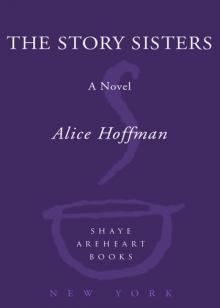 The Story Sisters
The Story Sisters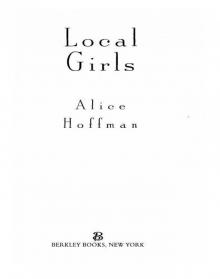 Local Girls
Local Girls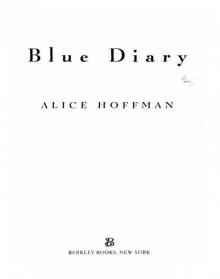 Blue Diary
Blue Diary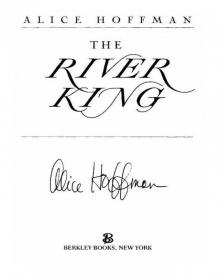 The River King
The River King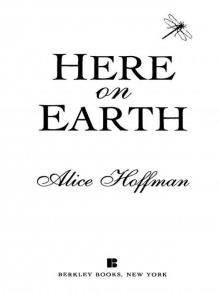 Here on Earth
Here on Earth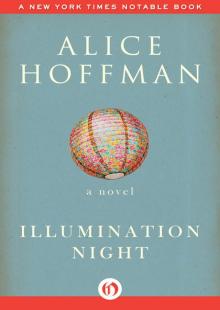 Illumination Night: A Novel
Illumination Night: A Novel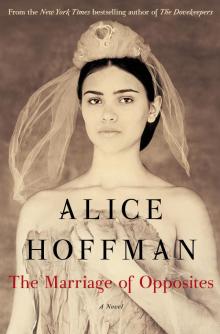 The Marriage of Opposites
The Marriage of Opposites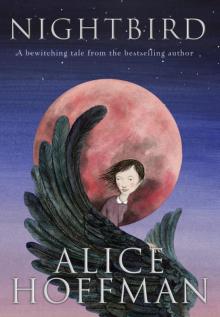 Nightbird
Nightbird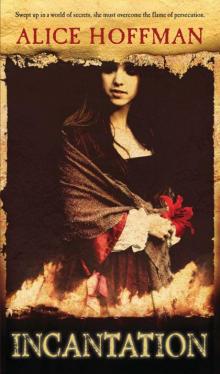 Incantation
Incantation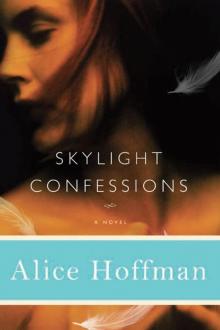 Skylight Confessions
Skylight Confessions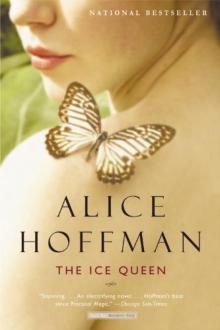 The Ice Queen
The Ice Queen Second Nature
Second Nature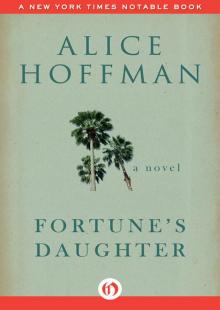 Fortune's Daughter: A Novel
Fortune's Daughter: A Novel Seventh Heaven
Seventh Heaven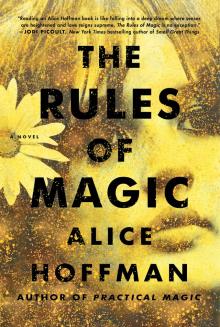 The Rules of Magic
The Rules of Magic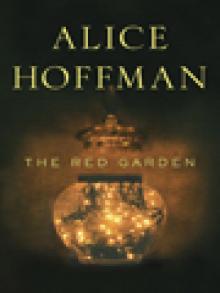 The Red Garden
The Red Garden The Third Angel
The Third Angel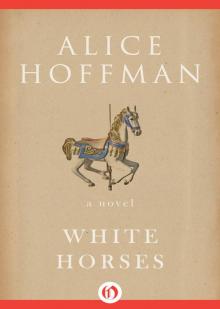 White Horses
White Horses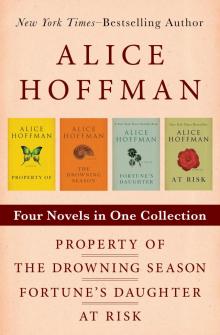 Property of / the Drowning Season / Fortune's Daughter / at Risk
Property of / the Drowning Season / Fortune's Daughter / at Risk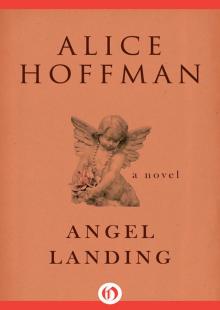 Angel Landing
Angel Landing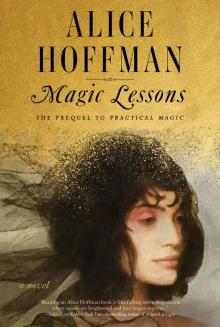 Magic Lessons
Magic Lessons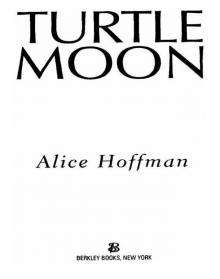 Turtle Moon
Turtle Moon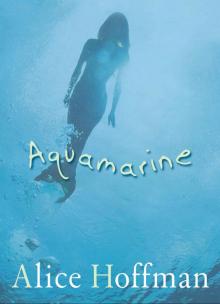 Aquamarine
Aquamarine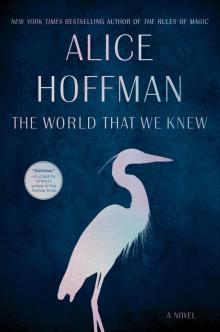 The World That We Knew
The World That We Knew Faithful
Faithful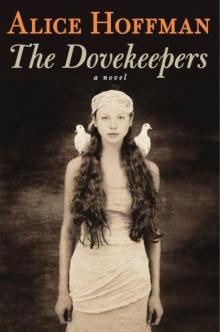 The Dovekeepers
The Dovekeepers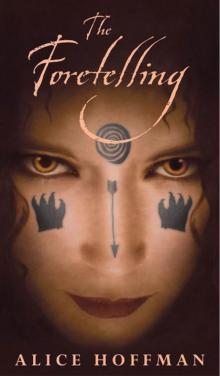 The Foretelling
The Foretelling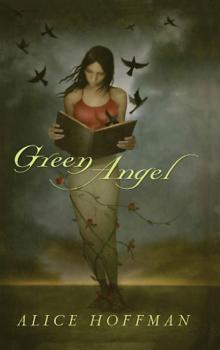 Green Angel
Green Angel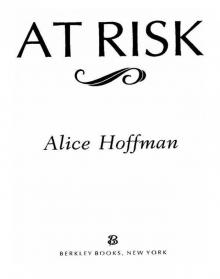 At Risk
At Risk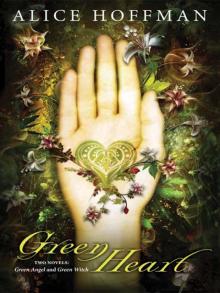 Green Heart
Green Heart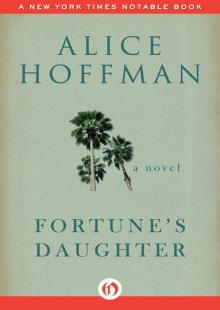 Fortune's Daughter
Fortune's Daughter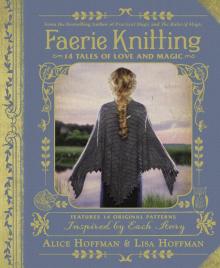 Faerie Knitting
Faerie Knitting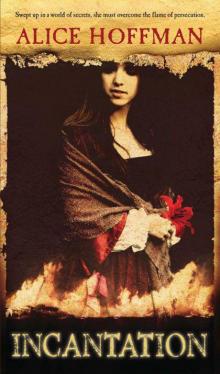 Incantation (v5)
Incantation (v5)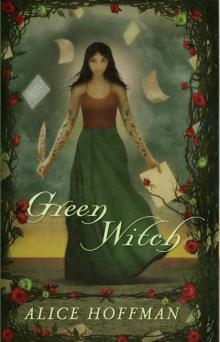 Green Witch
Green Witch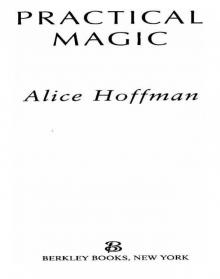 Practical Magic
Practical Magic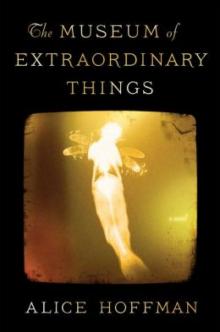 The Museum of Extraordinary Things
The Museum of Extraordinary Things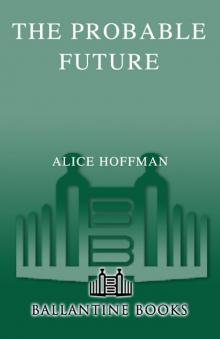 The Probable Future
The Probable Future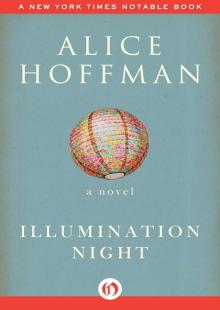 Illumination Night
Illumination Night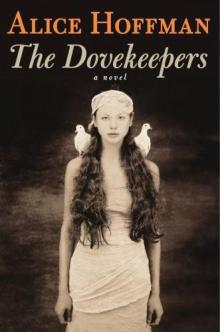 The Dovekeepers: A Novel
The Dovekeepers: A Novel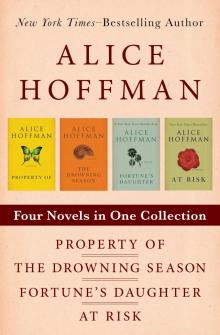 Property Of, the Drowning Season, Fortune's Daughter, and At Risk
Property Of, the Drowning Season, Fortune's Daughter, and At Risk